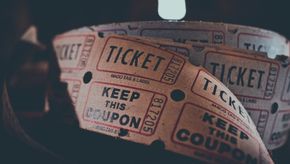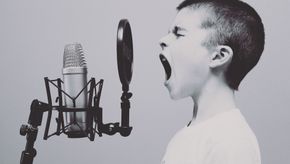Robert Glasper - Interview
Sophia Bischoff - A l'occasion de la venue de Robert Glasper au Cully Jazz Festival, Students.ch s'est associé à RepreZent.ch pour un entretient avec l'artiste.
Samedi 21 avril, le Cully Jazz Festival entame le dernier week-end de sa trentième édition. Au programme, de la musique, des jams et, surtout, la venue de Robert Glasper, un artiste américain qui dessine les frontières d’un jazz contemporain se mariant avec le hip-hop et les influences actuelles. A cette occasion, Students.ch s’allie à RepreZent.ch pour un entretient avec Robert Glasper.
Students.ch : I heard you were in Spain last night ?
Robert Glasper : Yop. And then tomorrow morning. This show were added later because somebody cancelled.
Students.ch : You’re one of those musicians who were born in a musical environment. Your Mom was a jazz singer. When and how did you really realise that you really wanted to follow into the music direction ?
Robert Glasper : I didn’t really get serious about doing anything musical until I was 12. I was doing sports. Then I started messing around with the piano. I didn’t really want to do it until I was 14.
Students.ch : The list of people you collaborated with is pretty impressive (Mos Def, Jay-Z, Kanye West. Erykah Badu, Talib Kweli, Common etc). Which one was the most memorable collaboration?
Robert Glasper : euhm. A lot of these were live shows. All of them were so dope. But I would probably say…the most recent one was Kanye. It was unexpected. I was playing at a jazz club. Him and Mos Def came to the show. I had Lupe Fiasco there as my special guess. That was a jazz club in New York. Kanye and Mos Def came on stage and everybody was screaming. Kanye West doesn’t go and jump on stage and freestyle. It’s not his thing. He did that that night. That was last year.
Students.ch : Who’s missing ? Who would you like to collaborate with ?
Robert Glasper : Cee-Lo, Busta Rhymes, André 3000, Little Wayne, Little Dragon, José Gonzales, Radiohead…
Students.ch : Your cover of Herbie Hancock’s “Maiden Voyage” is said to be inspired by Radiohead’s “Everything in its right place”.
Robert Glasper : I studied jazz in college and high school. I have a lot of jazz catalogue in my heart and in my mind. I played traditional jazz for a very long time. But at the same time, I’m a young guy and I’m influenced by what’s new in the world. This means that I’m a different area of jazz musician. John Coltrane didn’t have Radiohead, you know what I mean (laughs). He just had what he had around him. I know the tradition of music but I also know what’s modern and what’s hip. I just let it all influence me, I don’t block it off like some people do. They’re like “jazz, jazz, this is how jazz sounds”. I don’t block it, I just say “hey influence me!”. Whatever it is, if you don’t think it’s jazz, I don’t care. This is me being honest with myself. This is what I like.
Students.ch : And this maybe is why we describe you as a musician who’s putting jazz forward and making the future jazz. Do you think it’s right to describe you like this ?
Robert Glasper : Sure…I think so. For a very long time jazz is only been attended by other jazz people. It’s like you have to be a jazz enthusiast to go to jazz concerts. The average person doesn’t just get up and go to a jazz concert. They don’t even know where to go. It’s such a hidden small thing, at least in America. It’s very hidden, very small. Every State doesn’t have a jazz club. I feel like I’m making jazz cool and people that don’t listen to jazz listen to my album and me. So I think my audience is growing and getting more like hip-hop, younger and hip. I think that even if you have a younger audience it keeps the music around longer.
Students.ch : Why does jazz, hip-hop and soul tend to mix together to make this new sound and why does it sounds so good ?
Robert Glasper: It’s all naturally African American music. We’re all African American people and it’s natural for us. I grew up playing church and R&B music. Then I went to school for jazz. I also played hip-hop ‘cause it was natural for me. It wasn’t something I had to learn or go to school necessarily for it. Jazz, I did. But the hip-hop I just kinda learn while being with people and being around its the roots. It’s just natural that’s why it works. I think it all fix together also because it comes from jazz. Its tradition influences that music. When you lean jazz, it’s easier to go that kind of music. It’s supposed to be. Nowadays, it’s kinda not that way (laughs) but all those Motown records came from jazz musicians.
Students.ch : Even Rock…rock’n’roll came from blues…
Robert Glasper: Exactly. So that’s why it should be a natural progression.
Students.ch : How would you describe your last album, “Black Radio”
Robert Glasper: A hybrid of a bunch of stuff. (laughs) A hybrid of a bunch of music that come naturally with a lot of my favourite artiste
Students.ch : How was the creation process ?
Robert Glasper: It was actually pretty simple. The only hard part was scheduling. But once we got over this we went into the room with each artist played the song one time and recorded. We didn’t do rehearsal or things like that. It was spontaneous and very loos, very artsy. “Let’s see what happens”
Students.ch : Like a jam…
Robert Glasper: Exactly. Like a jam session. That’s exactly the vibe. It was a big jam session and it came out like that.
Students.ch : Why did you call it “Black Radio” ?
Robert Glasper: Because of the song I wrote with Yasiin Bey aka Mos Def. We wrote that song 4 or 5 years ago. It’s talking about the device in the airplane that holds all the information when the plane crashes. So we named the album “Black Radio” ‘cause I feel like when music around us crashes and burns, good music always survives. No matter what. Through the test of time, good music will always be around. But at the same time, it’s double sword cause there only black people in the album (laughs). You know, black radio artists. But that wasn’t my purpose at first.
Students.ch : Why do you sing with a modified voice on your album?
Robert Glasper: That’s Kasey, my saxophone player. I like that sound. None of us are singers. That’s a vocoder, that’s a keyboard. You sing in a mic and you play the notes on the keyboard.
Students.ch : Is it to hide the wrong notes ?
Robert Glasper: No, no. it’s just a put a different sound on the voice. Like a computer voice. They do have voice pitch things that kinda sound the same. People use them in R&B music. They are similar but it’s not the same thing. Herbie Hancock used those in 70s. It’s called a keytar and he used in vocoder. He’s the one that made that famous in the 70s. He has an album that J Dilla showed me, “Sunlight”, and that’s one of my favourite Herbie Hancock album. He’s using the vocoder on it.
Students.ch : In the hip-hop world, we can see two different directions. One is people doing to an electronic mainstream direction (like David Guetta and Snoop Dogg’s song) and the other ones are going back to the roots of music (like Raphael Saadiq or the Roots). How do you explain those two different direction ?
Robert Glasper: Ehm. Time. People just wanting to do something different. There’s so many different kind of music now and so many different producers that do different kind of stuff. I feel like when you’re a musician you tend to go back to where me and Raphael Saadiq are doing ‘cause we’re musician, we want to play. We don’t necessarily want to do MPC, computer. We want to play because we were born to play music. When you are not that you tend to go the other way or be more tempted to try something like that. I think it’s just having a lot of options and trying things out. There’s nothing wrong with that. I think it’s fine. I don’t like all of it but I’m glad that people are trying something different and not just doing the same things.
Students.ch : Don’t you think it’s sad to see hip-hop going to a mainstream direction?
Robert Glasper: No. I mean I don’t like all of it but it’s a stepping-stone to something different. What I do wasn’t that original but it’s a stepping-stone to get to where I am. Again, I don’t like everything but I’m glad that it’s evolving. At least we can say it changed versus “it’s the same thing”. I’d rather change. Jazz doesn’t change much. That I don’t like. I’d rather see jazz change to something I don’t like. At least it’s changing and it has the possibility to change into something I do like.
Students.ch : I feel like hip-hop is considerate like the punk of our time. We can see that hip-hop gigs are being cancelled or that there’s less of them in Swiss festivals because of fights and because the media linked it to hip-hop. Why do you think this culture is seen this way? Hip-Hop isn’t that!
Robert Glasper: I know. Some parts are like that and I think people concentrate on those parts too much. There are parts of hip-hop that are about gangs, fighting, killing but everything is not like this. I think hip-hop is the only passionate music left. No other music is that passionate. Everybody has something to say. I think it’s good. But shooting and those stuff are not good.
Students.ch : How did you came up with the idea to take “Smells Like Ten Spirit” and covering in a totally different song.
Robert Glasper : If you do a cover, either you do it exactly like the artist or you change it completely. I hate when people change it a little bit. I’m like “why did you even change it ?!”. For me, if I do a cover I change it completely or I do it pretty much like the artist just to pay homage or something like that. “Smells Like Ten Spirit” just happened. We were playing it and I thought of something, the other ones too. Every time we played it, it changed and then we came up with an arrangement. But for the record, in the studio, on “Black Radio” the arrangement happened through time and then we added the vocalist, Layla, on there. Only because she was eating and chilling at the studio. It wasn’t even her day to perform. She was just hanging out. When we did that song, we listened to it and I was like “hey wont you sing something ?”. And she did it !
Students.ch : Why this song ?
Robert Glasper : I’ve love that song since I was in 6th grade or something. The melody is very pretty, the changes are very pretty. It’s a nice song but it’s just so rocked out that you don’t realise how beautiful it is. The lyrics are cool, too. I wanted to do it in a different way so you can appreciate the lyrics and the beauty of the changes. And just give it a completely different vibe.
Students.ch : Do you think that Kurt Cobain would like it ?
Robert Glasper : I think he would.
Students.ch : Do you have any advice for students who would like to e a musician like you ?
Robert Glasper : I would say : study the music, study the history but don’t be held back by the history. Always keep an open mind, open ears. Don’t be afraid to be influenced but at the same time practice and learn. You have to learn the whole history before you become yourself. All the musicians are like “you have to learn the history first” and I’m like “we have a lot more history to learn that you do. We’re young we have a lot more stuff behind us so we can’t learn all that and then become ourselves !” Those musicians didn’t do that. Charlie Parker didn’t have hundreds years of music history to learn before he became himself. So study but, at the same time, don’t be held back by the history. A lot a young people tend to not learn any history. So there’s something missing when they’re playing.
Students.ch : I heard you were in Spain last night ?
Robert Glasper : Yop. And then tomorrow morning. This show were added later because somebody cancelled.
Students.ch : You’re one of those musicians who were born in a musical environment. Your Mom was a jazz singer. When and how did you really realise that you really wanted to follow into the music direction ?
Robert Glasper : I didn’t really get serious about doing anything musical until I was 12. I was doing sports. Then I started messing around with the piano. I didn’t really want to do it until I was 14.
Students.ch : The list of people you collaborated with is pretty impressive (Mos Def, Jay-Z, Kanye West. Erykah Badu, Talib Kweli, Common etc). Which one was the most memorable collaboration?
Robert Glasper : euhm. A lot of these were live shows. All of them were so dope. But I would probably say…the most recent one was Kanye. It was unexpected. I was playing at a jazz club. Him and Mos Def came to the show. I had Lupe Fiasco there as my special guess. That was a jazz club in New York. Kanye and Mos Def came on stage and everybody was screaming. Kanye West doesn’t go and jump on stage and freestyle. It’s not his thing. He did that that night. That was last year.
Students.ch : Who’s missing ? Who would you like to collaborate with ?
Robert Glasper : Cee-Lo, Busta Rhymes, André 3000, Little Wayne, Little Dragon, José Gonzales, Radiohead…
Students.ch : Your cover of Herbie Hancock’s “Maiden Voyage” is said to be inspired by Radiohead’s “Everything in its right place”.
Robert Glasper : I studied jazz in college and high school. I have a lot of jazz catalogue in my heart and in my mind. I played traditional jazz for a very long time. But at the same time, I’m a young guy and I’m influenced by what’s new in the world. This means that I’m a different area of jazz musician. John Coltrane didn’t have Radiohead, you know what I mean (laughs). He just had what he had around him. I know the tradition of music but I also know what’s modern and what’s hip. I just let it all influence me, I don’t block it off like some people do. They’re like “jazz, jazz, this is how jazz sounds”. I don’t block it, I just say “hey influence me!”. Whatever it is, if you don’t think it’s jazz, I don’t care. This is me being honest with myself. This is what I like.
Students.ch : And this maybe is why we describe you as a musician who’s putting jazz forward and making the future jazz. Do you think it’s right to describe you like this ?
Robert Glasper : Sure…I think so. For a very long time jazz is only been attended by other jazz people. It’s like you have to be a jazz enthusiast to go to jazz concerts. The average person doesn’t just get up and go to a jazz concert. They don’t even know where to go. It’s such a hidden small thing, at least in America. It’s very hidden, very small. Every State doesn’t have a jazz club. I feel like I’m making jazz cool and people that don’t listen to jazz listen to my album and me. So I think my audience is growing and getting more like hip-hop, younger and hip. I think that even if you have a younger audience it keeps the music around longer.
Students.ch : Why does jazz, hip-hop and soul tend to mix together to make this new sound and why does it sounds so good ?
Robert Glasper: It’s all naturally African American music. We’re all African American people and it’s natural for us. I grew up playing church and R&B music. Then I went to school for jazz. I also played hip-hop ‘cause it was natural for me. It wasn’t something I had to learn or go to school necessarily for it. Jazz, I did. But the hip-hop I just kinda learn while being with people and being around its the roots. It’s just natural that’s why it works. I think it all fix together also because it comes from jazz. Its tradition influences that music. When you lean jazz, it’s easier to go that kind of music. It’s supposed to be. Nowadays, it’s kinda not that way (laughs) but all those Motown records came from jazz musicians.
Students.ch : Even Rock…rock’n’roll came from blues…
Robert Glasper: Exactly. So that’s why it should be a natural progression.
Students.ch : How would you describe your last album, “Black Radio”
Robert Glasper: A hybrid of a bunch of stuff. (laughs) A hybrid of a bunch of music that come naturally with a lot of my favourite artiste
Students.ch : How was the creation process ?
Robert Glasper: It was actually pretty simple. The only hard part was scheduling. But once we got over this we went into the room with each artist played the song one time and recorded. We didn’t do rehearsal or things like that. It was spontaneous and very loos, very artsy. “Let’s see what happens”
Students.ch : Like a jam…
Robert Glasper: Exactly. Like a jam session. That’s exactly the vibe. It was a big jam session and it came out like that.
Students.ch : Why did you call it “Black Radio” ?
Robert Glasper: Because of the song I wrote with Yasiin Bey aka Mos Def. We wrote that song 4 or 5 years ago. It’s talking about the device in the airplane that holds all the information when the plane crashes. So we named the album “Black Radio” ‘cause I feel like when music around us crashes and burns, good music always survives. No matter what. Through the test of time, good music will always be around. But at the same time, it’s double sword cause there only black people in the album (laughs). You know, black radio artists. But that wasn’t my purpose at first.
Students.ch : Why do you sing with a modified voice on your album?
Robert Glasper: That’s Kasey, my saxophone player. I like that sound. None of us are singers. That’s a vocoder, that’s a keyboard. You sing in a mic and you play the notes on the keyboard.
Students.ch : Is it to hide the wrong notes ?
Robert Glasper: No, no. it’s just a put a different sound on the voice. Like a computer voice. They do have voice pitch things that kinda sound the same. People use them in R&B music. They are similar but it’s not the same thing. Herbie Hancock used those in 70s. It’s called a keytar and he used in vocoder. He’s the one that made that famous in the 70s. He has an album that J Dilla showed me, “Sunlight”, and that’s one of my favourite Herbie Hancock album. He’s using the vocoder on it.
Students.ch : In the hip-hop world, we can see two different directions. One is people doing to an electronic mainstream direction (like David Guetta and Snoop Dogg’s song) and the other ones are going back to the roots of music (like Raphael Saadiq or the Roots). How do you explain those two different direction ?
Robert Glasper: Ehm. Time. People just wanting to do something different. There’s so many different kind of music now and so many different producers that do different kind of stuff. I feel like when you’re a musician you tend to go back to where me and Raphael Saadiq are doing ‘cause we’re musician, we want to play. We don’t necessarily want to do MPC, computer. We want to play because we were born to play music. When you are not that you tend to go the other way or be more tempted to try something like that. I think it’s just having a lot of options and trying things out. There’s nothing wrong with that. I think it’s fine. I don’t like all of it but I’m glad that people are trying something different and not just doing the same things.
Students.ch : Don’t you think it’s sad to see hip-hop going to a mainstream direction?
Robert Glasper: No. I mean I don’t like all of it but it’s a stepping-stone to something different. What I do wasn’t that original but it’s a stepping-stone to get to where I am. Again, I don’t like everything but I’m glad that it’s evolving. At least we can say it changed versus “it’s the same thing”. I’d rather change. Jazz doesn’t change much. That I don’t like. I’d rather see jazz change to something I don’t like. At least it’s changing and it has the possibility to change into something I do like.
Students.ch : I feel like hip-hop is considerate like the punk of our time. We can see that hip-hop gigs are being cancelled or that there’s less of them in Swiss festivals because of fights and because the media linked it to hip-hop. Why do you think this culture is seen this way? Hip-Hop isn’t that!
Robert Glasper: I know. Some parts are like that and I think people concentrate on those parts too much. There are parts of hip-hop that are about gangs, fighting, killing but everything is not like this. I think hip-hop is the only passionate music left. No other music is that passionate. Everybody has something to say. I think it’s good. But shooting and those stuff are not good.
Students.ch : How did you came up with the idea to take “Smells Like Ten Spirit” and covering in a totally different song.
Robert Glasper : If you do a cover, either you do it exactly like the artist or you change it completely. I hate when people change it a little bit. I’m like “why did you even change it ?!”. For me, if I do a cover I change it completely or I do it pretty much like the artist just to pay homage or something like that. “Smells Like Ten Spirit” just happened. We were playing it and I thought of something, the other ones too. Every time we played it, it changed and then we came up with an arrangement. But for the record, in the studio, on “Black Radio” the arrangement happened through time and then we added the vocalist, Layla, on there. Only because she was eating and chilling at the studio. It wasn’t even her day to perform. She was just hanging out. When we did that song, we listened to it and I was like “hey wont you sing something ?”. And she did it !
Students.ch : Why this song ?
Robert Glasper : I’ve love that song since I was in 6th grade or something. The melody is very pretty, the changes are very pretty. It’s a nice song but it’s just so rocked out that you don’t realise how beautiful it is. The lyrics are cool, too. I wanted to do it in a different way so you can appreciate the lyrics and the beauty of the changes. And just give it a completely different vibe.
Students.ch : Do you think that Kurt Cobain would like it ?
Robert Glasper : I think he would.
Students.ch : Do you have any advice for students who would like to e a musician like you ?
Robert Glasper : I would say : study the music, study the history but don’t be held back by the history. Always keep an open mind, open ears. Don’t be afraid to be influenced but at the same time practice and learn. You have to learn the whole history before you become yourself. All the musicians are like “you have to learn the history first” and I’m like “we have a lot more history to learn that you do. We’re young we have a lot more stuff behind us so we can’t learn all that and then become ourselves !” Those musicians didn’t do that. Charlie Parker didn’t have hundreds years of music history to learn before he became himself. So study but, at the same time, don’t be held back by the history. A lot a young people tend to not learn any history. So there’s something missing when they’re playing.
Commentaires
 Login
Login 













